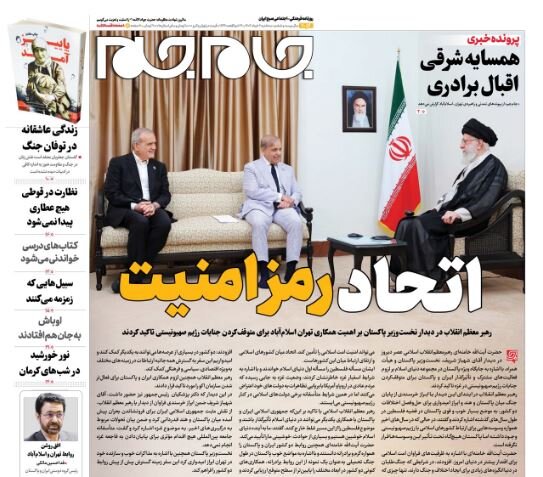Tehran – In a memo, Jam-e-Jam dealt with Iran’s unparalleled resistance, both in the sacred period of defence and in other times.
It writes as follows: The experience of Iranian history from the beginning of the imposed war shows that national solidarity and social cohesion are the most effective mechanisms for overcoming crisis and facing international, economic and security pressures. Scientific advances and achievements in new technologies have been made in a spirit of resistance and collective effort. These achievements have played an important role in strengthening Iran’s negotiation power in regional and non-regional strategic interactions, creating national deterrence. The fact that many countries and independent movements robbed Iran’s experience of resistance strengthened Islamic resistance and strategic stability against unilateral and hegemonic policies. A spirit of unity and determination was not only a robust barrier to the wave of division in overcoming instigation, but also a challenge at home and international competition. It was emerging strongly on the battlefield and diplomacy, and even vanquished the enemy’s hybrid wars in an effort to advance.
Sobh-e-no: The bitter experience of the promise of JCPOA
Sobh-e-No reports on Iran’s proposal to create a nuclear consortium of regional countries and US participation, but looks closely at the technical and political aspects to show that the plan could undermine the country’s strategic infrastructure in the nuclear industry. Such a proposal differs from the JCPOA’s failed experience. The recent proposal under the guise of regional cooperation is the same “zero percent enrichment” as is currently proposed in the new language. If the enrichment program is suspended domestically, the industry will suffer damage. If domestic facilities are closed and nuclear works are moved to one joint factory in the Iranian Islands, not only will the national technical equipment be destroyed, but in fact the ownership and management of the factory will also be in the hands of partner countries. Experience shows that such a plan is technically, economically and sovereignly harmful, and threatens Iran’s independence in the strategic nuclear field.
Etemad: Meet a Mediator
In his analysis, Etemad discussed Mr. Pezeshkian’s visit to Oman, writing: The visit sends a clear message about the depth and continuity of the relationship between Tehran and Muscat. A relationship with deep roots in the history of regional diplomacy and has always been on a path of trust and cooperation during its most sensitive periods, including the peak of international pressure on Iran. Not only did Oman not cut off ties with Iran, it was one of the few states that played a balanced and realistic role, becoming one of the major economic and political conduits of the Islamic Republic. History appears to be repeating itself, and with a situation where the prospect of a nuclear trade revival is unknown, Muscat has once again become a key player in Iran’s regional interactions. Therefore, part of the agenda of the President’s visit to Oman should be viewed as pursuing bilateral economic agreements, joint investment, development of port cooperation and increased trade exchanges. Therefore, Muscat appears to be one of the few capitals where Tehran can engage in complex issues such as the nuclear file and relations with the US, while at the same time strengthening the region’s long-term economic cooperation foundation.
Arman-e-Melli: Competition for share in JCPOA
In the commentary, Arman-e-Melli discussed European and US approaches to negotiations with Iran. According to this paper, one of the key points of this equation is the differences that exist between the US and Europe. Many analysts believe that Europe, one of the leading players in the JCPOA, wants to maintain and increase the share of the negotiation process more than the US. Especially under internal and external pressures from the US and Israel, European countries are trying to adopt a more stringent position on Iran and maintain an impact on the decision-making process. Furthermore, the US, which is no longer an official member of the JCPOA, has looked at negotiations differently, with its approach focusing more on pressure and imposing sanctions. These differences have put the talks in a state of uncertainty and pressure on Iran. However, Trump appears to prefer an agreement with Iran in the end. Because he knows the cost of conflict with opposition to regional tensions in Tehran and the Arab countries of the region.

